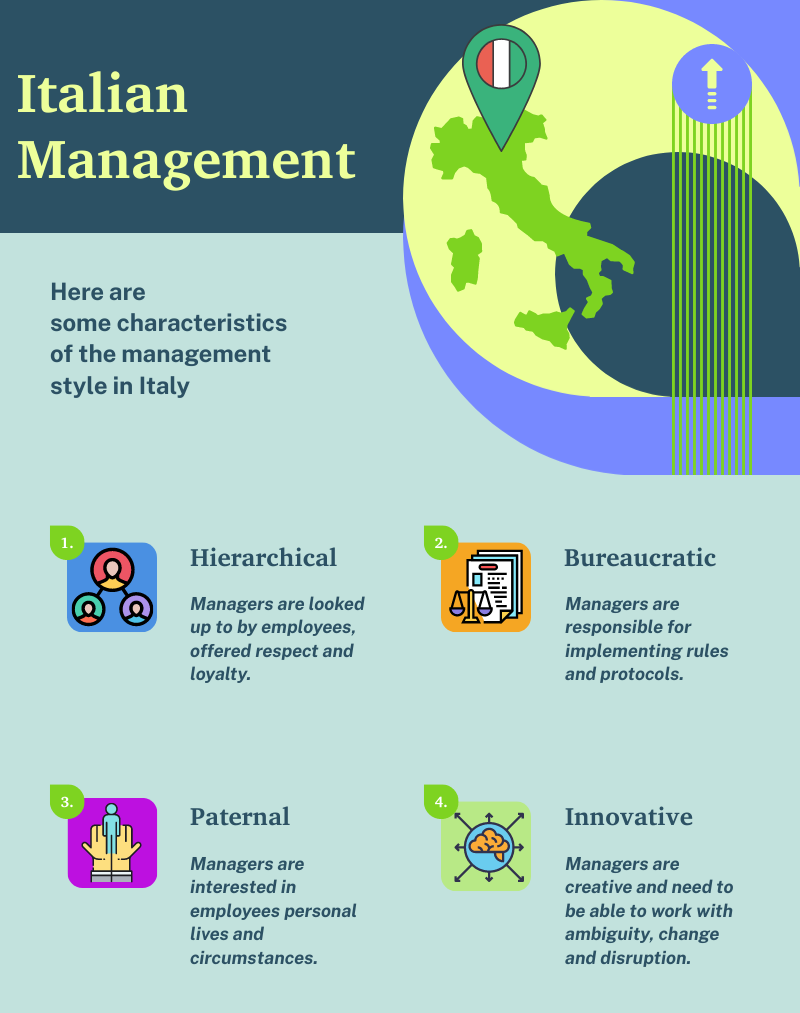
Cross Cultural Management Guide for Italy
The guidance offered below is for managers who want to learn more about the management style and business culture of Italy.
It provides some useful information for managers who are relocating to the country for employment as well as those who may have Italian employees in their global or multicultural teams.
Topics include:
- Hierarchy
- Leadership style
- Time
- Communication style
- Negotiation
Being a Manager in Italy
To manage successfully in Italy you need to understand the role of bureaucracy in getting things done.
- Italy is legendary for its maze of rules and regulations.
- Many businesses, including some large multinational companies, are family-owned which adds more layers of complexity.
- It is commonplace to find relatives working in the same company, often in the same department.
- Although business is taken quite seriously, the family and the good of the group are often more important than following the rules.
- Knowing the right people may allow you to find creative solutions to bureaucratic challenges.
The Role of a Manager
When managing Italians, it is important to keep in mind that each person has a very distinct role within the organization, and maintaining that role helps to keep order.
- Italian companies tend to be vertical and hierarchical; decisions are centralised and taken by the persons positioned at the top of the organization.
- People believe that their supervisors have been chosen because they have more experience and greater knowledge than those they manage, and it is, therefore, unnecessary, and even inappropriate for them to consult with lower-ranking individuals when decision-making.
- In Italy, as in other hierarchical societies, managers may take a somewhat paternalistic attitude toward their employees.
- They may demonstrate a concern for employees that goes beyond the workplace and strictly professional concerns.
Approach to Change
According to intercultural research, Italy is seen to have a medium tolerance for change and risk.
- Innovations need to have a track record or history noting the benefits if they are to be accepted and implemented.
- The fear of exposure, and the potential embarrassment that may accompany failure, bring about aversion to risk and the need to thoroughly examine the potential negative implications.
- While in risk-tolerant environments, failure is perceived as a learning process that encourages confidence in future ventures, failure in Italy causes a long-term loss of confidence by the individual as well as by others.
- Because of this attitude, cultural sensitivity is going to be required, especially when conducting group meetings and discussing contributions made by participating individuals.
Approach to Time and Priorities
Italy is a moderate time culture and typically and there may be some flexibility to strict adherence to schedules and deadlines.
- Nevertheless, the expectations of global working have caused the Italians to adopt relatively strict standards of adhering to schedules.
- Effective management skills will depend on the individual’s ability to meet deadlines.
Decision-Making
It is important to remember that hierarchy is important, especially when it comes to decisions.
- Decisions are made by the people at the top, and whilst subordinates may express their thoughts, they are generally cautious about giving explicit advice or criticism.
- The decision-making process is quite long in Italy, due to the many layers of hierarchy.
- Verbal agreements and handshakes are still considered good enough for an agreement, however, most agreements are also in writing.
- In family-owned businesses (which include companies such as Fiat), most members of the family are involved in the day-to-day running of the operation.
Boss or Team Player?
Italians like working in teams and collaborate well. The communication within a team is generally quite collegial, albeit somewhat direct and blunt.
- Role allocation within the team is generally quite clearly defined and people will take greater responsibility for their specific task than for the group as a whole.
- Successful management will depend on the individual’s ability to harness the talent of the group assembled and develop any resulting synergies.
- The leader will be deferred to as the final authority in any decisions that are made, but they do not dominate the discussion or generation of ideas.
- Praise should be given to the entire group as well as to individuals.
- Employees follow the procedures handed down by their managers.
Communication and Negotiation Styles
In the north, people are direct, see time as money, and get down to business after only a brief period of social talk. In the south, people take a more leisurely approach to life and want to get to know the people with whom they do business.
- Italians often speak their minds, and it is common for them to express any disagreement during meetings and negotiations.
- Allow your Italian business colleagues to set the pace for your negotiations.
- Never use high-pressure tactics and always adhere to your verbal agreements.
- Failing to follow through on a commitment will destroy a business relationship.
- Heated debates and arguments often erupt in meetings; this is simply a function of the free flow of ideas.

Get Expert Support
If you want help navigating Italian business culture, then sign-up for your own two hour live webinar with one of our Italy experts.
They will tailor the course just for you!

 +44 0330 027 0207 or +1 (818) 532-6908
+44 0330 027 0207 or +1 (818) 532-6908

